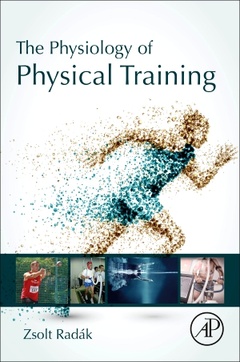The Physiology of Physical Training
Auteur : Radák Zsolt

The Physiology of Physical Training provides complete coverage of the physiological and methodological aspects of physical training, providing essential knowledge for anyone involved in exercise physiology. Physiological processes at the cellular level (and for the whole organism) are covered to better explain particular training methods and convey a deeper knowledge and understanding of training techniques. Coverage of exercise training-induced adaptive responses and the most appropriate training methods to bring about targeted adaptive changes are also included. This is the perfect reference for researchers of physiology/kinesiology and human kinetics, practicing coaches, graduate students and sports medicine specialists.
1. Basic cellular functions, cellular adaptation, and metabolism2. Skeletal muscle, function, muscle fiber types3. Adaptation, phenotypic adaptation, fatigue, overtraining4. Fundamentals of strength training5. Fundamentals of endurance training6. Speed as complex conditional ability7. Fundamentals of joint flexibility8. Diet and sport9. Physical training and prevention10. Physical training and aging11. Sport genetics
Since 2008 he has been the head of the only sport science doctoral school in Hungary. From September 2014 he was professor and head of the Research Institute of Sport Science, University of Physical Education. He has been a visiting professor at Toho University, Juntendo University, and Waseda University in Japan, Rennes University in France, Texas University in the USA, and Beijing Sport University in China.
- Describes exercise-induced adaptation, from the cell to the whole body
- Demonstrates practical applications of exercise for injury, disease prevention and improved physical performance
- Fully integrates the knowledge of molecular exercise physiology and training methods
Date de parution : 06-2018
Ouvrage de 280 p.
15x22.8 cm
Thème de The Physiology of Physical Training :
Mots-clés :
Acceleration ability; Adaptation; Aerobic endurance; Agility test; Aging; Ball games; Bradykinin; Caffeine; Caloric restriction; Cancer; Cardiovascular aging; Cardiovascular diseases; Cell; Cellular adaptation; Central nervous system; Conditional ability; Creatine monohydrate; Diet; DNA; Endurance; Epigenetic factors; Exercise; Fatigue; Flexibility test; Force; Free radical theory; Gene; Growth hormone; Heart; Homeostasis; Human body; Inflammation; Insulin-like growth factor; Intensity; Intermyofibrillar; Joint flexibility; Macro-cycle; Measuring strength; Metabolism; Micro-cycle; mtDNA; Muscle; Muscle contraction; Muscle fibers; Muscle hypertrophy; Muscle soreness; Muscles; Myotatic reflex; Nutrition; Organelles; Organisms; Overtraining; Periodization; Physical activity; Physical training; Proprioceptive neuromuscular facilitation; Reaction time; Sarcomere; Sarcomeres; Skeletal muscle; Speed; Sport genetics; Sports; Strength training; Subsarcolemmal; Tendons; Testing; Theory of aging; Training; Training plan; VO2; VO2max; Weight-class sports
